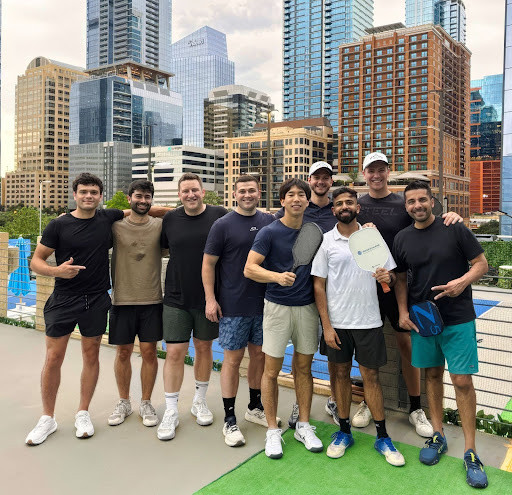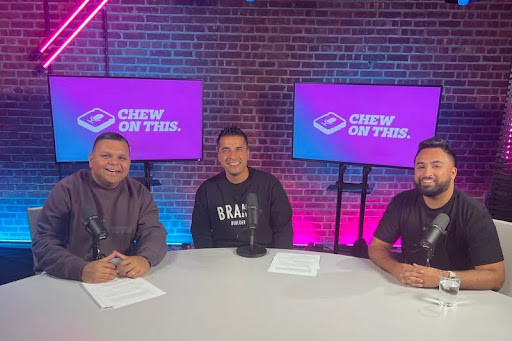The Power of Play: How Pickleball, Panels and Real Conversation Are Fueling 7-Figure Deals

In a world saturated with webinars, cold DMs, and overhyped masterminds, a quiet revolution is reshaping how founders connect and create meaningful opportunities to grow with one another. The most significant business developments aren't happening in boardrooms or on Zoom calls anymore. They are unfolding over pickleball games, rooftop panels, and casual conversations that feel more like friendships than forced networking.
Founder-led events have rapidly emerged as perhaps the most underrated growth hack in today's business landscape. These curated, real-life experiences are sparking 7-figure partnerships, funding rounds, and customer relationships that no marketing funnel could ever hope to replicate.
The New Networking Paradigm
"People want to work with people they know, trust, and relate to," says JJ Carter, founder of Gldn PR, a premium media firm that helps entrepreneurs and high-growth companies land major press, TV, and podcast placements. "Founder-led events create that trust faster than anything else I've seen in my career."
Carter has witnessed firsthand how showing up in the right room can shortcut years of outreach efforts and build instant credibility—something particularly valuable in today's increasingly digital business environment.
A prime example occurred at a recent founder-focused pickleball event hosted by Social Snowball, an eCommerce affiliate automation platform that's quietly disrupting the DTC world. What appeared to be a friendly game among peers quickly evolved into high-level conversations between growth leaders like Zohaib Rattu, VP of Growth at Social Snowball, and Neal Goyal, VP of Sales at Disco, the AI-powered commerce media network helping brands reach millions of shoppers across consumer apps and eCommerce platforms.
The Unexpected Power of Digital Touchpoints
Sometimes, the pathway to these valuable in-person connections begins in digital interactions. For Carter, the invitation to this event came through a simple, yet optimized, social media channel - a LinkedIn comment.
"Our Director of Growth at Gldn PR, CR Page, commented thoughtfully on an industry post that caught the attention of one of the event organizers," Carter explains. "That single genuine interaction led to a direct message, which led to an invitation. A few days later, we were playing pickleball with decision-makers that would have taken months to reach through traditional methods."
This anecdote underscores the multiplier effect when personal branding, public relations, and authentic engagement converge. The organizers mentioned that Page's reputation for insightful commentary and the agency's growing profile in the DTC space made the invitation a natural fit.
"It wasn't just about who we knew—it was about how we were perceived in the industry," Carter notes. "The careful reputation-building we'd been doing through content, PR placements, and engagement created the opportunity that physical networking then capitalized on."
Rattu revealed, "After sharing a court for an hour, we established more trust than six months of emails or traditional marketing could have ever built."
Why It Works: The Psychology Behind Play-Based Networking
This clear pattern is emerging across industries as founders discover several key principles:
- Casual environments lead to authentic conversations. Without the pressure of nametags or formal pitches, people naturally share their actual challenges, opportunities, and needs, not just rehearsed elevator pitches.
- Shared experiences accelerate trust formation. Whether playing a sport, co-hosting a dinner, or sharing perspectives on a panel, the resulting bonds differ fundamentally from those formed through conventional networking.
- Community has become a form of currency. The most valuable clients, investors, and collaborative partners increasingly emerge from within strong, aligned founder networks rather than cold outreach.
Measurable Results Beyond Relationships
The ROI of this approach is increasingly tangible. Multiple founders report 6- and 7-figure outcomes from single conversations sparked over shared interests or common challenges. Most surprisingly, this approach doesn't require massive budgets or celebrity keynote speakers, just intentionality and authenticity.

For Goyal at Disco, the payoff was immediate: "After our pickleball match with the Social Snowball team, we not only found a great technology partner but also gained introductions to three other DTC brands that were perfect fits for our platform."
The Future of Founder Networking
As traditional conference attendance continues to decline post-pandemic, these micro-events and interest-based gatherings are filling the void and potentially offering something more valuable. They're creating environments where founders can be themselves while simultaneously advancing their business objectives.
"You don't need to be in every room," Carter emphasizes. "You just need to be in the right one, with people who share your values and vision."
The exclusivity factor shouldn't be overlooked either. Unlike massive conferences where anyone can purchase a ticket, these founder-led events typically operate through invitation or referral only, creating natural curation that enhances their value.
Creating Your Own Play-Based Business Development
For founders looking to leverage this trend, the pathway is clear but requires commitment:
- Start small and specific. Begin with gatherings around activities you genuinely enjoy with 8-12 carefully selected participants.
- Prioritize experience over agenda. The best connections happen when the focus is on shared enjoyment rather than forced networking.
- Create consistency. One-off events don't build communities; regular gatherings do.
- Balance structure with spontaneity. Provide enough organization to make attendees comfortable but enough freedom for organic connections.
- Build your digital reputation. As Carter's experience shows, the groundwork for valuable in-person connections often begins with thoughtful online engagement and strategic PR that positions you as someone worth meeting.
As traditional marketing channels become increasingly saturated and expensive, this return to relationship-first business development offers a refreshing and effective alternative. The most forward-thinking founders aren't just building companies, they're building communities where significant deals happen naturally.
In the words of one founder who recently closed a 7-figure acquisition that began at a casual rooftop panel: "I spent years thinking business development meant perfect pitch decks and formal meetings. Turns out, it actually means being human first, founder second."
So whether you're launching a brand, pitching a product, or scaling your company, consider this your permission to embrace play. That next game, dinner, or casual conversation could be worth far more than you imagine if you're in the right room with the right people.
The only question is: which founders are creating these opportunities in your industry, and are you on their invite list?
© Copyright IBTimes 2025. All rights reserved.





















